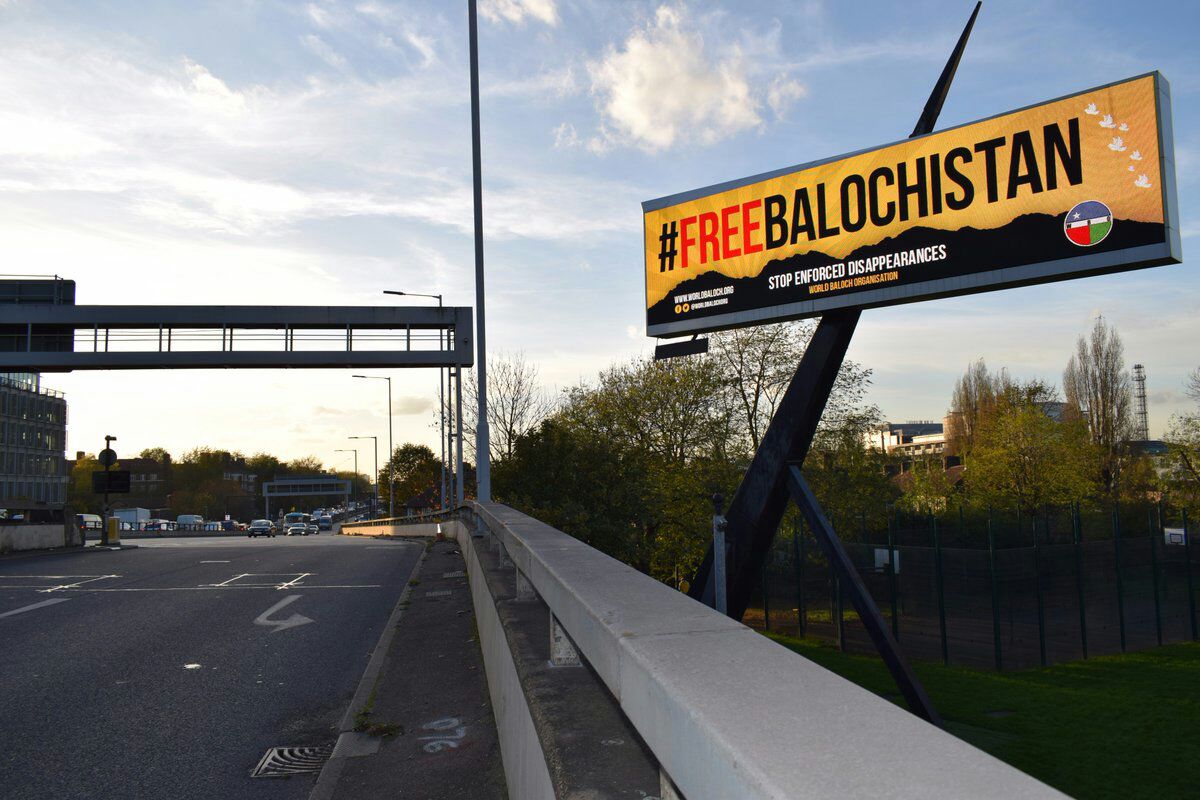On the 2nd of November, the World Baloch Organisation (WBO) launched the #FREEBALOCHISTAN campaign in London, focusing on the dire situation of the Baloch people and urging for the end of enforced disappearances in Balochistan. The campaign kicked-off with a series of banners advertised on cabs, which circulated around the city of London getting the attention of pedestrians and drivers. In a clear attack to freedom of expression, the Pakistani government pressured local authorities to shut down the campaign and, shortly after, Transport for London (TfL) ordered the removal of the banners from the cabs. Since then, articles have featured in some of the major British newspapers denouncing Pakistan’s attack on the WBO campaign, a clear offense to freedom of expression. However, WBO has moved forward to the second phase of the campaign, which includes billboards on some of the main roads of London and its surroundings (see photo above), and will remain committed to raising awareness of the human rights violations committed against the Baloch people.
Below are extracts of the articles published, respectively, by The Guardian and The Independent:
“Transport for London appears to have caved in to pressure from the Pakistan government and banned London taxi advertisements that draw attention to its human rights abuses in the war-torn disputed province of Balochistan […] Pakistan’s high commissioner in London, Syed Ibne Abbas, requested the Foreign Office ban the adverts. The UK high commissioner to Pakistan, Thomas Drew, was summoned by the government of Pakistan and told that such adverts ‘should not be allowed’. Within 24 hours, TfL ordered the adverts to be pulled, ostensibly on the grounds that they were ‘controversial and sensitive’ in violation of clause (h) of its advertising policy. However, the advert organisers, the World Baloch Organisation (WBO), argue that most reasonable people would not regard the wording as controversial or sensitive. They note that clause (h) states that adverts promoting humanitarian-type causes will “not normally be disapproved”, even if they are controversial or sensitive […] WBO activists allege that Pakistan is seeking to impose on the UK the same censorship about Balochistan that it imposes inside Pakistan. It’s iron-fisted rule is so brutal that it will not allow journalists, human rights monitors and aid agencies to enter Balochistan. These adverts are necessary to expose the crimes of Pakistani forces, they argue […] TfL needs to rethink its decision. The appearance of kowtowing to a government that is committing daily atrocities is a bad look. I hope the mayor of London will intervene to get WBO’s adverts reinstated.” (Peter Tatchel for The Guardian)
“Transport for London has said ‘Free Balochistan’ adverts put up by a human rights charity must be removed from black cabs in London. The move follows an attempt by the Pakistani government to have the adverts removed, though TFL told The Independent the advert did ‘not comply with our advertising guidelines’. The World Baloch Organisation, which advocates for rights of the ethnic Balochs who live in the Balochistan regions straddling Pakistan, Afghanistan and Iran, launched its campaign on London’s black cabs on Monday highlight the ‘war crimes and human rights abuses’ of the Islamabad government. It said the Pakistani government has put unfair pressure on the Foreign Office and Transport for London, which regulates black cabs, to remove the adverts. The #FreeBalochistan adverts, which also carry slogans saying ‘Stop enforced disappearances’ and ‘Save the Baloch people’, were launched as part of a campaign to increase awareness of the conflict in south-west Pakistan which has periodically flared up since Partition in 1947 […]” (Caroline Mortimer for The Independent)

